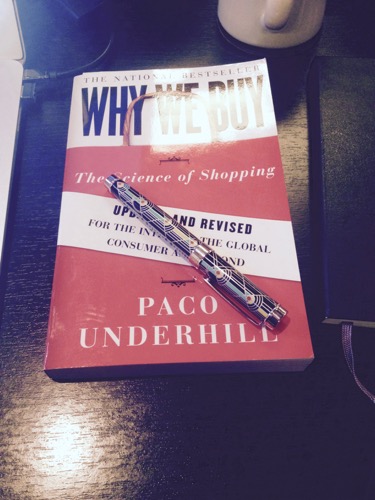 August 2008. I show up to my first college class, Introduction to Psychology, at 8:00 AM. That very first lecture, my professor — who in the coming weeks inspired me to take up Psych as a second major — offhandedly recommends this book. Fast forward eight (!) years. I see the bright red cover on a shelf in San Francisco, 2,500 miles from the lecture hall in the heart of Penn State main campus where I first heard the title. And it all comes back. I skim the table of contents. Read the first page. The whole first chapter. And then I just look up and sigh and — standing there in Barnes & Noble — kick myself. Should have dropped Twilight circa '08 and made time. (Okay, so what. I read Twilight. But it was for a girl. A pretty one. Yes, I still regret it.) Moving on... In Why We Buy, Paco Underhill, self-proclaimed "retail anthropologist," explores the science of shopping, that is the timeless, universal buying habits of humans in commercial spaces. Science? Yes. One derived from tens of thousands of hours of direct observation, in person or via security footage. Mr. Underhill (or Paco-san as he's affectionately called by his Japanese fans) and his international team of 'trackers' have spent over twenty years trotting around the globe, recording everything that people do from the moment they enter a store to when they exit, from American bookstores like the one where I rediscovered it to the Grand Bazaar in Turkey to Paris and San Paulo, Tokyo and Dubai, New York City and everywhere in between. |
| "Using a system of shorthand notation we've developed over the years, a combination of symbols, letters and hash marks, a tracker can record, for instance, that a bald, bearded man in a red sweater and blue jeans entered a department store on a Saturday at 11:07 AM, walked directly to a first-floor display of wallets, picked up or otherwise touched a total of twelve of them, checked the price tag on four of them, chose one, and moved at 11:16 to a nearby tie rack, stroked seven ties, read the content tags on all seven, read the price on two, then bought none and went directly to the cashier to pay." |
| It's tough to say whether Why We Buy is a comprehensive distillation of Paco and team's findings or an example-packed primer. I suspect the latter, because the breadth of topics covered — men vs. women shoppers, displays and signage, items shelf-positioning, predictions on the future of e-commerce, store layouts to maximize traffic flow, and more — is just too much to talk about in 300 pages — and too lucrative to give away. What he does share is well worth the book's $10 price tag and time to read, for any marketer, store manager, or even discerning consumer. As someone who works in the e-commerce space, I see tons of parallels to the digital world too. |
| Let me end on a word about one underlying theme throughout the book, which, thankfully, Paco doesn't overlook, or apologize for: the virtues of business — buying and selling. There's a ton of unearned guilt that entrepreneurs and shoppers too often accept. It's easy when we hear an endless chorus of voices condemning money and the focus on it as something low or ugly or unimportant — even immoral. 'Materialistic,' 'Greedy,' 'Selfish,' Those voices might say — if they're kind. I prefer Paco's characterization, because I think, as someone who's closest to the buying and selling, his voice is probably much more true, even if it isn't as loud or repetitive. |
| "[Shopping] illuminate[s] how we human beings go through life searching, examining, questioning, and acquiring and assuming and absorbing the best of what we see. At that exalted level, shopping is a transformative experience, a method of becoming a newer, perhaps even slightly improved person. The products you buy turn you into the other idealized version of yourself." |
Later, Paco elaborates that,
| "It is not too far-fetched to say even that stores have become places of worship — sites for the exaltation of man-made things, temples where we can express and reaffirm and share our belief in self-improvement, beauty, knowledge or fun." |
Here's to the virtues of buying, selling, and self-improvement. {JG}


















